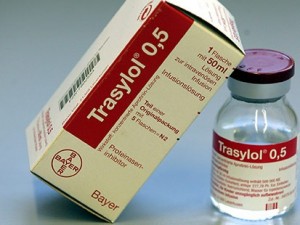Trasylol Side Effects
Serious Side Effects of Trasylol
- urinating less frequently or not at all
- persistent vomiting
- tension or pain in chest, rapid or abnormal heart rates
- strong and persistent headaches, feeling dizzy or confused, passing out
- difficulty speaking or seeing
- numbness of the body (especially on one side)
- increased severity of asthma, lung disorders, or breathing problems
- rapid weight gain or enlargement of the extremeties
- serious allergic reaction with symptoms of hives, a rash, swelling of the mouth, tongue, throat or face, hoarseness and trouble breathing
Common Side Effects of Trasylol
- signs of an infection with may include a fever, chills and soreness of the throat
- feeling as if you might pass out
- upset stomach or nausea and vomiting
- changes in bowels: diarrhea, loose stools, or constipation
- trouble urinating
- difficulty sleeping, or feeling restless
Warnings & Recalls for Trasylol
Trasylol and Pregnancy
Trasylol is a U.S. Food and Drug Administration
pregnancy Category B medicine. Studies do not show Trasylol to be harmful to the fetus when taken by a pregnant woman; however, this medicine has not been tested in pregnant humans. If you are
pregnant,
plan to become pregnant or are
breastfeeding,
consult your doctor first and discuss the benefits and risks of receiving Trasylol.
General Warnings
Before receiving Trasylol, be sure to let your healthcare provider know about any
pre-existing conditions you may have, especially if you:
- are allergic to anything, particularly any ingredient in Trasylol
- are pregnant, may become pregnant, or are currently nursing a child
- take any medications, vitamins, supplements, or herbal products
- have a kidney disorder
- have ever had heart surgery
Ask your doctor about safely taking Trasylol while using other medicines. Certain medications
may interact with this drug.
Aminoglycosides and
angiotensin-converting enzyme (ACE) inhibitors may alter the effects of Trasylol on the body and may be unsafe.
Trasylol Treatment and Use
Trasylol | aprotinin injection belongs to a category of medicines called protease inhibitors and is marketed by Bayer for preventing the loss of large amounts of blood during heart surgeries. Trasylol may benefit patients by reducing the chance of needing a blood transfusion to replace lost blood during these procedures.
Trasylol has not been approved for use in children.
How Does Trasylol Work?
Trasylol slows and reduces bleeding by decreasing inflammation that occurs during heart surgery. This helps to keep patients from losing too much blood during or after surgery.
Trasylol Dosage Information
Trasylol is administered by a nurse or healthcare professional as an intravenous (IV) injection. Dosage amount vary depending on the patients condition and treatment type. However, a general loading dosage of 200mL is typically given followed by 50mL per hour necessary. Be sure to keep all appointments for administration and follow-up to ensure that you are receiving proper dosage amounts that are effective for your case.
Other Names for Trasylol
Brand name: Trasylol
Generic name: aprotinin injection
Lawsuits & Legal Information for Trasylol
Author:
Lauren Cohrs
Posted on Oct 10, 2012
